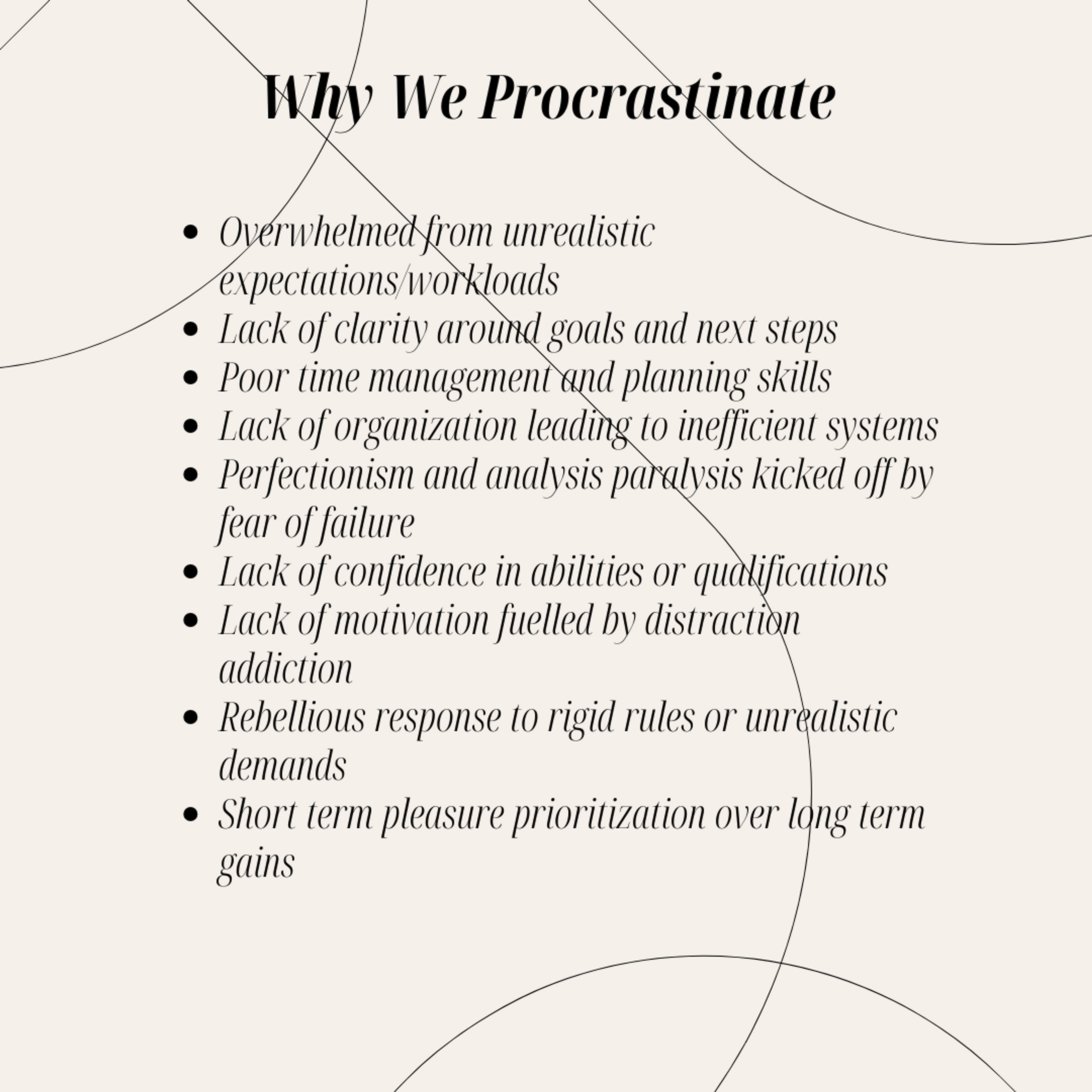Battling Procrastination: Tips for Overcoming Your Worst Enemy


We all have important goals we want to achieve and meaningful work we aim to accomplish. Yet despite grand intentions, it’s easy to fall into patterns of procrastination - allowing distraction and avoidance to rule our precious time and energy instead of purposeful action.
As the laundry list of to-dos piles up and critical projects remain stuck gathering dust, the pull of procrastination only grows stronger. Avoidance breeds more avoidance when faced with accumulated evidence of our stalled progress.
But procrastination doesn’t have to be a lifelong sentence. With some thoughtful strategies centered on understanding the 'why’ behind procrastination, reshaping your environment and routines to empower productivity, and cultivating the right mindset shift, you can break out of this discouraging cycle for good!
Let’s explore the root causes behind procrastination, as well as tangible solutions you can start implementing today to overcome your worst enemy and channel focus toward meaningful goals. The time for change is now!
Why We Procrastinate

Before charging forward with anti-procrastination strategies, it’s important to understand WHY we postpone important work in the first place. The reasons are varied and often interconnected. Common motivations include:
- Overwhelmed from unrealistic expectations/workloads
- Lack of clarity around goals and next steps
- Poor time management and planning skills
- Lack of organization leading to inefficient systems
- Perfectionism and analysis paralysis kicked off by fear of failure
- Lack of confidence in abilities or qualifications
- Lack of motivation fuelled by distraction addiction
- Rebellious response to rigid rules or unrealistic demands
- Short term pleasure prioritization over long term gains
As you can see, there are diverse triggers ranging from skill deficits that can be improved to psychological barriers that warrant self-compassion. The ‘why’ behind your personal procrastination likely involves a combination of factors. Carefully assessing what thought patterns or behaviours commonly precede procrastination in your life can illuminate the most relevant solutions.
For example, someone chronically disorganized might most benefit from project management training while a burned out overachiever needs rest and restored work-life balance. There is no one size fits all approach, making personalized assessment key.
Reframing Your Mindset Before implementing external habit changes or productivity hacks, the foundational work of shifting internal perspective can have profound impact. Our relationship with productivity is framed by underlying beliefs that often require challenging.
Essential mindset shifts include:
1. Reject Perfectionist All or Nothing Thinking
The insistence that work must be done ‘perfectly’ or not at all is a surefire path to endless procrastination. If tasks only feel worthy of your time and energy at some imaginary quality level you’ll never reach, starting at all feels futile. Recognize perfectionism for what it is - an unsustainable myth that serves ego more than outcomes. Accomplishing tasks imperfectly still moves the needle while staring blankly avoids all progress.
2. Swap Micro Goal Focus for Finish Lines
Relatedly, the instinct to ruminate on a project in its entirety can feel totally overwhelming, especially given competing priorities. But no monumental task, like writing an eBook for example, gets tackled all at once. The only way to ‘eat an elephant’ is one bite at time. If milestones feel ambiguous, create micro goals that divide intimidating projects into daily to-do lists full of specific, manageable activities. “Write chapter outline” is far less daunting than “Write next best selling book”.
3. Balance Process AND Outcome Orientation
Goal driven individuals are often intensely outcome focused - advancing relentless toward some big target like career promotion or business launch. But hyper focus on distant benchmarks often backfires by fueling anxiety. Absorbing yourself in the smaller process goals that ultimately accumulate into outcomes breeds satisfaction. Savoring the journey amplifies motivation.
4. Detach From False Urgency of Low Priority Items
Emails, texts, Slack notifications and the like train us to operate in a state of continual reactiveness. The frequent pings signaling another task begging for attention overrides intentional focus. But just because something demands your attention urgently does not mean it is actually important. Before springing to action, discern what high impact goals currently deserve proactive focus so you don’t get perpetually pulled off track.
5. Harness Positivity to Fuel Motivation
During cycles where procrastination runs rampant, negativity becomes our default state. Beating yourself up seems to motivate change. But this scarcity mindset - where fear drives action - never leads to sustainable consistency. Choose to see procrastination as temporary, harmless, and solvable through positive progress rather than evidence of permanent failure or self-sabotage. Speak to yourself with the supportive language you would offer loved ones working to improve.
Environment Design for Productivity
With the right internal belief system framed, crafting external conditions that empower productivity comes next. Small tweaks to your physical space, digital systems, and daily routines can yield huge changes by setting you up for efficiency and inspiration.
Key strategies include:
- Declutter Your Workspace - While a bit of visual complexity sparks creativity, most procrastinators already reside in spaces overflowing with half-finished projects that constantly drain mental bandwidth. Just scanning unfinished work triggers anxiety. Create a lean environment to minimize overwhelm where active projects take center stage, not perpetual piles.
- Establish Unplugged Sacred Space - Between kids needing attention and work chaos ensuing, craving an oasis of peace for unbroken focus is reasonable. But constant interruptions prohibit the ability to tune in to creative flow where productivity breeds more productivity. Define parameters around sacred space - a designated location/period where you ritualistically 'unplug' from digital disruptions until intentional completion of key priorities.
- Systemize Recurring Tasks - Lack of organization around routine tasks like paying bills or scheduling appointments invites last minute chaos perpetually derailing progress. Develop regimented systems around recurring items on your plate so they no longer weighing heavily on your mind and distracting from more stimulating goals. Never allow admin to eat first at the table.
- Create Visible Accountability - Humans are visual creatures. Keep your most important goals, projects, and next step micro-actions top of mind through daily exposure. Vision boards, whiteboards, Post It walls etc allow you to track progress and cue urgency. Enable helpful peer pressure by keeping productivity tools visible to household members.
- Foster Inspiring Conditions - Procrastination loves misery and boredom. Seek out resources that spark joy, curiosity and renewal while working to reverse innovation stagnation. Rotate locations, prioritize learning, hang visionary art, grow office plants; influence your habitat to defeat dullness! What signs of life fill you with inspiration and purposeful focus? Manifest those ambiances.
Building Anti-Procrastination Routines Transforming your daily habits and systematic approach toward completing work is vital for defeating entrenched procrastination urges. Powerful tactics include:
- Time Block Your Calendar - Procrastinators chronically underestimate effort required for tasks leading to loose timelines quickly derailed by distraction or competing priorities. Become ruthlessly realistic. Define blocks on your calendar designated for priority projects and assignments ensuring you make consistent progress in targeted areas daily despite disruption.
- Batch Similar Priorities - Relatedly, rapid activity switching between unrelated tasks makes sustaining focus difficult as each changeover requires mental transition time and drains stamina faster. Organize similar priorities to complete in batches - check emails just twice daily, schedule all meetings back-to-back, do creative work in long intervals with breaks only after output completes.
- Construct Daily Rituals - Productivity thrives through habitual routine. Design your own optimized daily rituals conducive for achievement - wake early to tackle hardest item first fueled by favorite breakfast, integrate midday movement to recharge mental clarity kept safe from meetings, disconnect fully in the evening. Repeat sequences where you experience flow.
- Set Recurring Alarms - Use alarm reminders strategically to cement new behaviours until ingrained habitually. Stay accountable to task time limits, remind yourself to change venues, announce break times. Utilize alarms as a virtual mentor ensuring you adhere to schedule blocks despite temptation to drift.
- Gamify Tasks - Inject a spirit of playfulness around mundane to-do’s by infusing game elements like scores, rules for ‘winning’, friendly competition etc. See each task as a challenge to overcome briskly rather than drudgery. Apps like Habitica allow you to track productivity visually on fantasy driven interfaces for stimulation.
Cultivating Accountability
Left to our own devices, procrastination easily wins out day after day. But when we manufacture external accountability through any of the below avenues, follow through becomes far more likely:
- Find an Accountability Buddy - Connect with a mutually trusting friend or colleague aiming to overcome similar procrastination pitfalls. Check in regularly around shared goals and current projects. Celebrate small wins but also offer honest feedback if you notice your peer drifting off track. Verbal commitment to an accountability partner significantly increases follow through.
- Join a Mastermind Group - Take group accountability to the next level by joining or forming your own mastermind group involving consistent peer-to-peer coaching. Report on weekly progress toward quantifiable goals and receive troubleshooting, feedback and motivation from your circle of comrades. Surrounding yourself with likeminded individuals accelerates growth.
- Hire a Coach - Coaches provide next level accountability through targeted advice, tracking mechanisms, and unconditional support on your improvement journey. Unlike friends, coaches maintain no attachment to your outcomes, so can challenge you freely without fear of impacting relationship health. And their specialized expertise equips them to diagnose issues using objective assessments.
- Publicly Commit Through Blogging - Sharing your goals and documenting the quest to achieve them through a blog inherently builds accountability to external audiences now awaiting your progress reports! Relatable vulnerability has a way of rallying supportive community. And knowing readers expect consistent content updates will help solidify your commitment.
- Use Gamified Apps - Bring a spirit of playfulness to your accountability efforts by using game-inspired apps that let you visually track habits formed, facilitate quests centered on specific metrics, earn rewards for milestones etc. Most incorporate ways to engage friends for enhanced accountability and competition.
Defeating procrastination for the long haul means committing to both inner and outer transformations. Adjust unsupportive beliefs, environment triggers, and habits while also leaning on community reinforcement to stay the course when old patterns creep back in. Through multi-dimensional strategy, lifelong behaviour change is absolutely possible. The time to seize control of your precious time, energy and potential is now!


